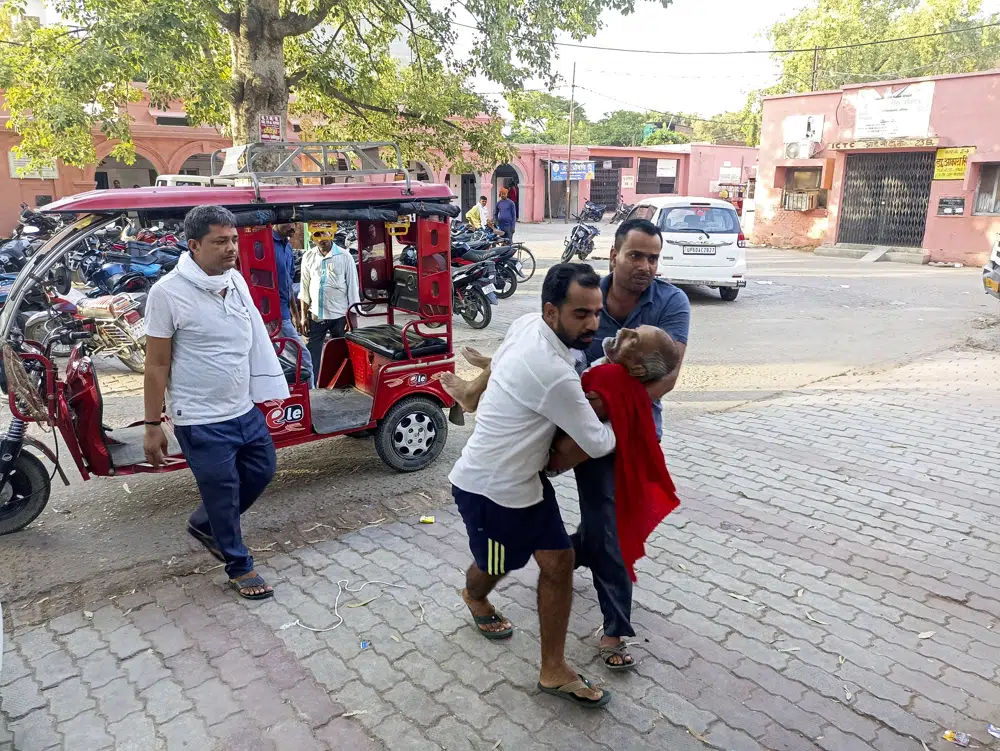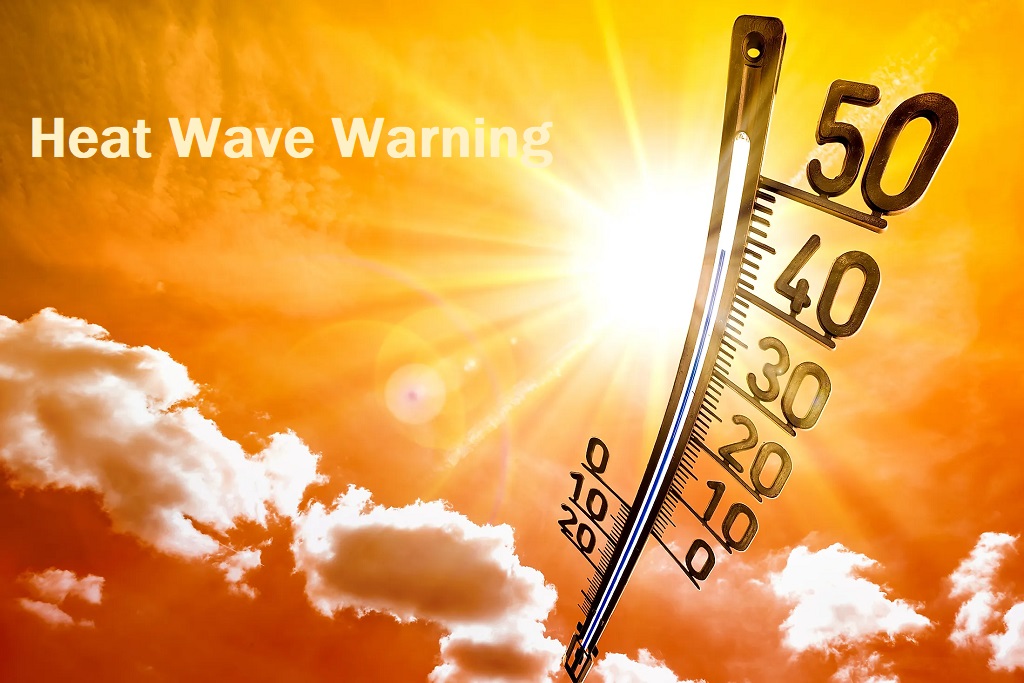News
People Dropping Dead from Heat Wave in India’s 2 Most Populous States

Officials announced that at least 96 people died in two of India’s most populous states during the last few days, as the country grappled with a blistering heat wave. The deaths occurred in the northern state of Uttar Pradesh and eastern Bihar, where authorities advised inhabitants over the age of 60 and those suffering from various illnesses to stay home during the day.
All 54 deaths in Uttar Pradesh were recorded in the Ballia area, around 300 kilometres (200 miles) southeast of Lucknow, the state capital. Authorities discovered that the majority of people who died were over 60 years old and had preexisting health issues that may have been aggravated by the extreme heat.
According to S. K. Yadav, a medical officer in Ballia, 300 patients have been hospitalised to the district hospital in the last three days for various ailments exacerbated by heat.
Due to the severity of the situation, authorities in Ballia cancelled leave applications and offered additional hospital beds in the emergency department to accommodate the surge of patients.
According to The Associated Press, the majority of the hospitalised patients are over the age of 60 and have symptoms such as high fever, vomiting, diarrhoea, breathing difficulties, and cardiac problems.
R.S. Pathak, a Ballia resident who lost his father on Saturday, claimed he saw an increase in the number of patients at the hospital’s emergency ward while attending to his father.
“Nothing like this has ever happened in Ballia.” “I’ve never seen so many people die as a result of the heat,” he remarked. “People are afraid to go out. The highways and markets are mostly vacant.”
Ballia, like the rest of central and eastern Uttar Pradesh, is currently experiencing terrible heat.
On Sunday, the maximum temperature in the district was 43 degrees Celsius (109 degrees Fahrenheit), which was five degrees more than the average range. The relative humidity was recorded at 25%, amplifying the heat’s effect.
Temperatures in the state are currently above normal, according to Atul Kumar Singh, a scientist with the India Meteorological Department. He went on to say that “no relief is expected in the next 24 hours.”
According to the IMD, heat wave conditions in portions of Uttar Pradesh will linger until June 19.
Brijesh Pathak, the state’s health minister, stated that an investigation into the deaths of “so many people” in Ballia had begun.
The blazing heat has consumed most of eastern Bihar, resulting in 42 deaths in the last two days. 35 of the deaths occurred at two hospitals in Patna, the state capital, where over 200 people were being treated for diarrhoea and vomiting.
On Saturday, the maximum temperature in Patna was 44.7 degrees Celsius (113 degrees Fahrenheit).
In most of India, the primary summer months — April, May, and June — are generally the hottest, before monsoon rains bring lower temperatures.
However, temperatures have risen during the last decade. During heat waves, the country typically experiences significant water shortages, with tens of millions of its 1.4 billion people without access to running water.
According to a study conducted by World Weather Attribution, an academic organisation that investigates the causes of high heat, a scorching heat wave that hit portions of South Asia in April was rendered at least 30 times more likely by climate change.
In April, the heat killed 13 people during a government function in Mumbai, India’s financial centre, prompting several governments to cancel all schools for a week.
World Health Organization: How to stay cool during a heat wave, you should:
At night, relocate to the coolest room in the house. If you can’t keep your house cool, spend 2-3 hours a day in a cool area (such as an air-conditioned public facility). Avoid going outside in the middle of the day.
If possible, avoid strenuous physical activities. If you must engage in vigorous activity, do so during the coolest period of the day, which is usually between 4:00 and 7:00 a.m. Keep to the shade.
Never leave children or pets in parked cars.
During a heatwave, take chilly showers or baths to keep your body cool and moisturized. To stay cool, you can also use cold packs and wraps, towels, sponging, and foot baths. Wear light, loose-fitting natural-fiber clothing.
Wear a wide-brimmed hat or cap and sunglasses if you walk outside. To reduce heat accumulation, use light bed linen and sheets and no pillows. Drink frequently, but avoid alcohol, coffee, and sugar. Eat smaller meals more frequently. Protein-rich foods should be avoided.
During a heatwave, if you feel dizzy, weak, worried, or have strong thirst and headache, it is preferable to get to a cool spot as quickly as possible and test your body temperature. To rehydrate, drink some water or fruit juice.
If you have painful muscular spasms (especially in the legs, arms, or belly), rest immediately and swallow electrolyte-containing oral rehydration treatments. If heat cramps linger more than an hour, get medical attention. Consult your doctor if you experience unexpected symptoms or if they continue.
If you or someone you care for has heated, dry skin, delirium, convulsions, or is unconscious, call a doctor or an ambulance right away. While waiting for assistance, move the person to a cool location, place him or her in a horizontal position, elevate legs and hips, remove clothing, and begin external cooling, such as placing cold packs on the neck, axillae, and groyne, fanning continuously, and spraying the skin with water at 25-30 °C. Take your body temperature. Give no acetylsalicylic acid or paracetamol. Place a sleeping person on his or her side.
During a heatwave, try to keep your living area cool. Check the room temperature between 08:00 and 10:00, 13:00 and after 22:00 at night. Ideally, the room temperature should be kept below 32 degrees Celsius during the day and below 24 degrees Celsius at night. This is especially crucial for newborns and those over the age of 60, as well as those with chronic medical disorders.
Open all of your windows and shutters at night and early morning when the outside temperature is cooler. Close the windows and shutters (if accessible) during the day, especially those facing the sun. Turn off all artificial lighting and electrical appliances. On windows that get morning or afternoon sun, hang shades, draperies, awnings, or louvres. To chill the air in the room, hang wet towels. It is worth noting that the humidity of the air rises at the same time.
If your home has air conditioning, close the doors and windows to preserve electricity that is not needed to keep you comfortable, ensuring that power remains available and reducing the possibility of a community-wide outage. Electric fans may provide relief, but they may not prevent heat-related sickness when the temperature is above 35 °C. It is critical to stay hydrated.
































